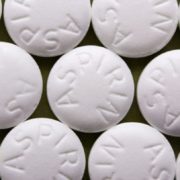Taking aspirin has for a long time been believed to help stave off heart attack and strokes. But results from a new study says that taking a daily aspirin may actually bring some risks for some people.
A new study published in the New England Journal of Medicine found that rates of heart disease, disability, or dementia were not brought down by taking a daily “baby” aspirin. It also found that taking the aspirin increased the risk of death — primarily from cancer — in those 65 years or older.
“Clinical guidelines note the benefits of aspirin for preventing heart attacks and strokes in person with vascular conditions such as coronary artery disease. The concern has been uncertainty about whether aspirin is beneficial for otherwise healthy older people without those conditions,” said Richard J. Hodes, director of the National Institute on Aging.
“This study shows why it is so important to conduct this type of research, so that we can gain a fuller picture of aspirin’s benefits and risks among healthy older persons,” he added.
The study involved over 19,000 people from Australia and the U.S. who were ages 70 years or older (65 years and older among Hispanics and blacks in the U.S.), and who did not have cardiovascular disease, dementia, or disability. Half of the participants took a low-dose aspirin of 100 milligrams daily, and the other half took a placebo.
The three party study, which took place over a span of five years from 2010 to 2014, did not see much of a difference between the groups when it came to dementia or disability as a result of taking aspirin. It did though, see a higher risk of bleeding from those that took aspirin, compared to those that took the placebo (3.1 percent compared to 2.7 percent).
“The use of low-dose aspirin as a primary prevention strategy in older adults resulted in a significantly higher risk of hemorrhage and did not result in a significantly lower risk of cardiovascular disease than placebo,” said a conclusion of the study which was published in three papers.
When it came to the overall death rate, 5.9 percent of aspirin takers placed higher than the 5.2 percent of the placebo takers. In regards to death from cancer, those in the aspirin group were more likely at 3.1 percent, compared to the 2.3 percent in the placebo group.
“The increase in cancer deaths in study participants in the aspirin group was surprising, given prior studies suggesting aspirin use improved cancer outcomes,” said Leslie Ford, M.D. associate director for clinical research, NCI Division of Cancer Prevention. “Analysis of all the cancer-related data from the trial is under way and until we have additional data, these findings should be interpreted with caution.”





